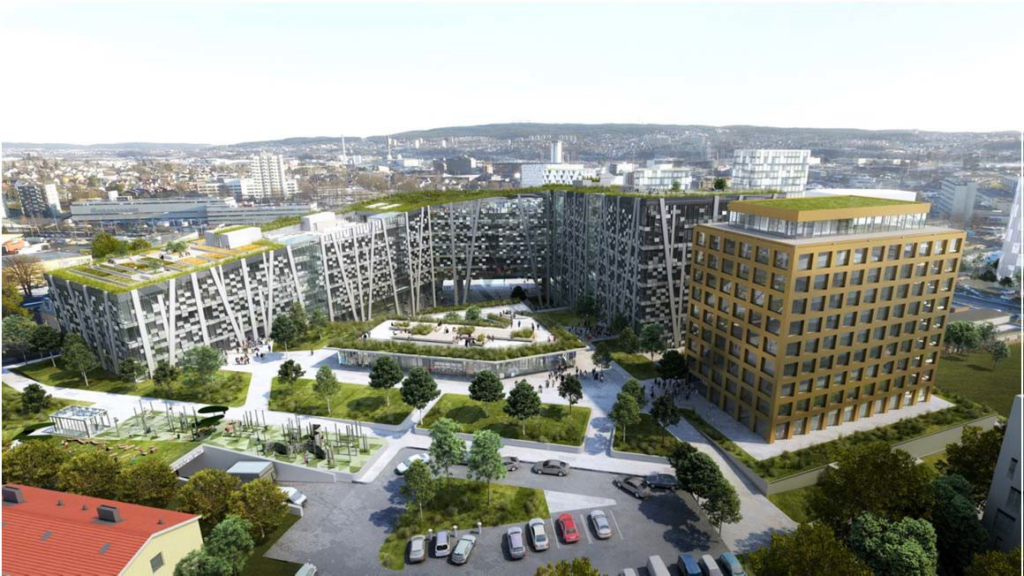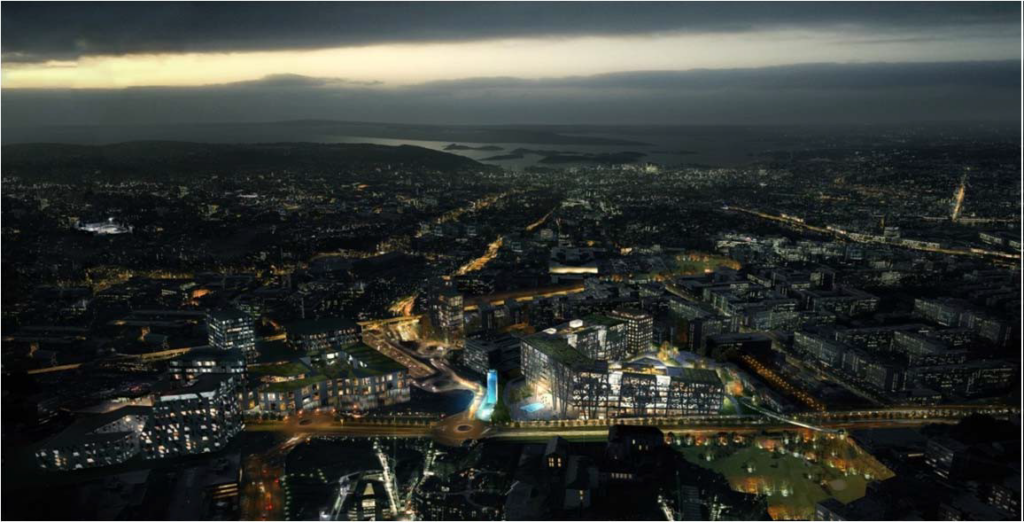Økern Portal, an innovative office building with WICONA façades using Hydro CIRCAL 75R end-oflife recycled aluminium, one of the most sustainable aluminium alloys which is currently available on the market. Hydro CIRCAL 75R is a prime quality aluminium with a certified content of more than 75% recycled post-consumer scrap.
The project, designed by DARK Arkitekter, has an area of 80,000 sqm – including office spaces, a Radisson RED hotel, common areas and food court – and has been developed under the highest energy efficiency standards. The entire outer layer is made of WICONA façades using Hydro CIRCAL 75R end-oflife recycled aluminium, a solution committed to the environment and that contributes to it being a highly sustainable building. The project design also advocates for the restoration of biodiversity through expansive green roofs and local crops. Energy consumption, pollution and the supply of materials have been carefully audited to ensure sustainable construction and an extended life cycle, while complying with the standards for obtaining the BREEAM Excellent classification. The building takes the form of a forest with a series of paths that connect the urban area, to the east, and the suburbs, to the west. The “stems” grow out of a lightweight base, branching out to support the structure. The “leaves” that adorn the façade are segmented to catch the light and provide a sense of movement. The surprising shape of the building creates a strong identity within the vast surrounding urban landscape and, in turn, the architectural details serve to humanise it. To increase the amount of public space, the building has a cantilever design so that the entire park flows through it. In addition, in this area, leisure and restaurant areas have been placed with the goal of generating life and activity at all hours.

© Dark arkitekter/Luxigon
Today, the construction sector in Europe represents 40% of its total energy consumption, producing 35% of the greenhouse gas emissions and accounting for a third of the waste generated on the planet. In 2018, 37000 tons of CO2 were released. This has a huge environmental impact but, at the same time, it also indicates that there is great potential for reducing it. As of December 31, 2020, European legislation will require all new buildings to operate at zero-energy, meaning, most of the energy used by the building must come from renewable energy. Furthermore, it requires that by 2030, the gases responsible for the greenhouse effect will have been reduced by 40%, and by 80% in the year 2050. The construction sector plays a fundamental role in making this possible.1
14,600 m2 of façades made with the WICTEC EL evo curtain wall by WICONA
“In this building, there is a large façade to cover and fenestration plays an important part. There has actually been a lot of discussions throughout the project about how we should design the façade to adapt them to the requirements of the BREEAM certification. And we were very excited to learn that we could have a façade made of a recycled material with Hydro CIRCAL 75R and thus be able to even incorporate sustainability on the façades,” explains Arne Reisegg-Myklestad of DARK Architects. For the unique outer layer of the building, the WICTEC EL evo curtain wall solution has been specially adapted to meet the project’s requirements, consisting of a modular aluminium supporting structure with thermal break for double glazed windows in viewing areas and high-insulation opaque panels. The outdoor sun protection system is based on a Venetian-type blind with slats and, to integrate it into the façade, WICONA has developed customised vertical guide rails and large-format horizontal covers. The WICTEC EL evo curtain wall solution guarantees very high safety and performance, backed by numerous patents and certifications that qualify it as an innovative and high-tech façade. It also offers unique freedom in the design of each project thanks to its ease adaptation to any concept. Production is carried out in the workshop, which guarantees a high level of safety and process quality, in addition to significant savings in terms of time and costs.
Hydro CIRCAL 75R, prime quality aluminium made with a minimum of 75% recycled end-of-life aluminium (post-consumer scrap)
To reduce the carbon footprint of construction materials, it is essential to control the manufacturing of construction products, while encouraging the circular economy of this system, that is, the recycling and reuse of the materials that are used.
Hydro CIRCAL 75R is a material certified by DNV-GL, an independent body that guarantees that 75% of the material comes from post-consumer aluminium, meaning aluminium that has reached the end of its life cycle. This represents one of the biggest developments in recent years when it comes to sustainability in the construction market.
To really understand how big of an advance this is in reducing its emissions, here are two facts: the European average of emissions is 8.6 kg of CO2 per kg of aluminium. Globally, the average is 18 kg of CO2 per kg of aluminium. With Hydro CIRCAL 75R, this number decreases to around 2.0 kg of CO2 for each kg of aluminium, the lowest CO2 emissions on the market.2
The production process of Hydro CIRCAL 75R starts at Hydro in Dormagen (Germany), where the recycled material that is suitable to produce this aluminium alloy is chosen, and ends in a Hydro plant in Clervaux (Luxembourg), where primary aluminium is added to the recycled aluminium until obtaining a material that is once again suitable for construction. The process of obtaining this material is 10 times purer than conventional systems, its CO2 emissions are well below the average in the current market, reducing it by almost 40% compared to the emissions from a conventional aluminium process. Økern Portal is one of the first projects made with WICONA façades using Hydro CIRCAL 75R aluminium. “We work in an industry that emits a large carbon footprint, both in the city and in nature.
We want it to become a positive footprint, through sustainability,” says Tor Christian Møglebust of DARK.
Project: Økern Portal
Location: Oslo, Norway
Architectural firm: DARK Arkitekter
Façades by: Staticus
WICONA solution used: WICTEC EL evo customised unitised curtain wall
Photos: Courtesy of Dark Arkitekter/Luxigon

© Dark arkitekter/Luxigon
About WICONA
A German brand founded in Ulm in 1948, WICONA has become a global benchmark for technologically advanced aluminium solutions for curtain walls, solar protection, doors and windows, including bullet- and fireproof systems. It has introduced to the market the most advanced innovations that have been progressively adopted by all manufacturers, including the thermal breaks for aluminium frames.
WICONA continues to demonstrate its focus on efficiency and sustainability by using thermal insulation strips made from recycled polyamide, which helps to significantly reduce CO2 emissions. With sustainability being one of the brand’s key objectives, WICONA controls all the production phases to guarantee the optimal performance of its systems and, together with designers and façade developers, creates customised solutions constantly pushing the boundaries of energy efficient and sustainable buildings. WICONA belongs to the Norwegian company Hydro, a fully integrated aluminium company with 35,000 employees in 40 countries on all continents, combining local expertise, worldwide reach and unmatched capabilities in R&D.
SEE THE WHOLE PRESS RELEASE HERE
For more information, contact WICONA’s communication agency
Bosch & Serret, S.A. Gran Via, 646, 2º2ª 08007 Barcelona. Tel. 93 415 58 62
Teresa Quintas – tquintas@boschyserret.com

